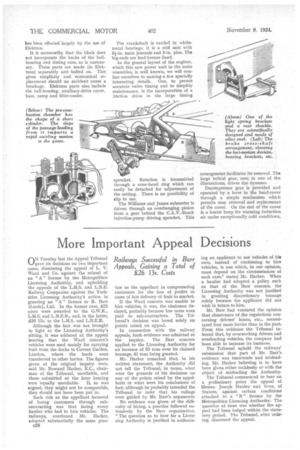More important Appeal Decisions
Page 58

If you've noticed an error in this article please click here to report it so we can fix it.
Railways Successful in Barr Appeals, Gaining a Total of £26 13s. Costs ON Tuesday last the Appeal Tribunal agave its decisions on two important cases, dismissing the appeal of L. V. Ward and Co. against the refusal of an "A" licence by the Metropolitan Licensing Authority, and upholding the appeals of the L.M.S. and L.N.E. Railway Companies against the Yorkshire Licensing Authority's action in granting an " A" licence to R. Barr (Leeds), Ltd. In the former case, £21 costs were awarded to the G.W.R., L.M.S. and L.N.E.R., and, in the latter, £26 13s, to the L.M.S. and L.N.E.R.
Although the fact was not brought to light at the Licensing Authority's sitting, it was adduced at the appeal hearing that the Ward concern's vehicles were used mainly for carrying fruit from the docks to Covent Garden, London, where the loads were transferred to other lorries. The figures given at the original inquiry were, said Mr. Rowasid Harker, K.C., chairman of the Tribunal, unreliable, and those submitted at the later hearing were 'equally unreliable. If, as was argued, they might not be comparable, they should not have been put in.
Such risk as the appellant incurred of losing customers through subcontracting was that facing every haulier who had to hire vehicles. The railways, continued Mr. Harker, adopted substantially the same pra.c c28 tice as the appellant in compensating customers for the loss of profits in cases of late delivery of fruit to market.
If the Ward concern was unable to hire vehicles, it was, the chairman declared, probably because low rates were paid to sub-contractors. The Tribunal's decision was based solely on points raised on appeal.
In connection with the railway, appeals, fresh evidence was admitted at the inquiry. The Barr concern applied to the Licensing Authority for an increase of 55 tons over its claimed tonnage, 41 tons being granted.
Mr. Harker remarked that, in his written statement, the Authority did not tell the Tribunal, in terms, what were the grounds of his decisions on any of the points raised by the appellants or what were his conclusions of fact, although he probably intended the Tribunal to infer that his rulings were guided by Mr. Barr's arguments.
No evidence was given of the difficulty of hiring, a practice followed extensively by the Barr organization. " The question as to how far a Licensing Authority is justified in authoriz ing an applicant to use vehicles of his own, instead of continuing to hire vehicles, is one which, in our opinion, must depend on the circumstances of each case," stated Mr. Harker. When a haulier had adopted a policy such as that of the Barr concern, the Licensing Authority was not justified in granting discretionary tonnage solely because the applicant did not wish in future to hire.
Mr. Barr had ventured the opinion that observance of the regulations concerning drivers' hours, etc., necessitated four more lorries than in the past. From this evidence the Tribunal inferred that, by overworking drivers and overloading vehicles, the company had been able to increase its business.
The Tribunal upheld the railways' submission that part of Mr. Barr's evidence was inaccurate and misleading, Mr. Harker believing it to have been given either recklessly or with the object of misleading the Authority.
The Tribunal commenced to hear on a preliminary point the appeal of Messrs. Joseph Huxley an.d Sons, of Staines, against certain conditions attached to a " B " licence by the Metropolitan Licensing Authority. The question at issue was whether the appeal had been lodged within the statutory period. The Tribunal, after retiring, dismissed the appeal.
























































































































